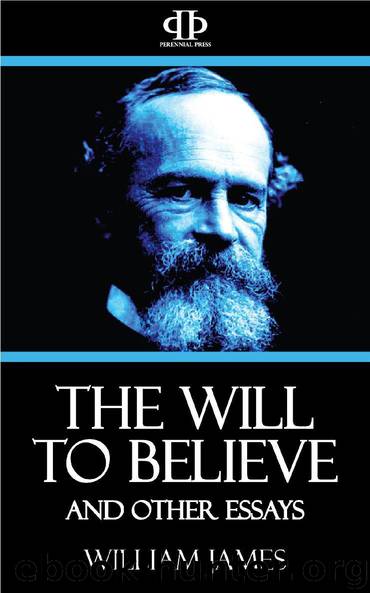The Will to Believe and Other Essays by William James

Author:William James
Language: eng
Format: epub
Publisher: Perennial Press
THE MORAL PHILOSOPHER AND THE MORAL LIFE.
~
THE MAIN PURPOSE OF THIS paper is to show that there is no such thing possible as an ethical philosophy dogmatically made up in advance. We all help to determine the content of ethical philosophy so far as we contribute to the race’s moral life. In other words, there can be no final truth in ethics any more than in physics, until the last man has had his experience and said his say. In the one case as in the other, however, the hypotheses which we now make while waiting, and the acts to which they prompt us, are among the indispensable conditions which determine what that ‘say’ shall be.
First of all, what is the position of him who seeks an ethical philosophy? To begin with, he must be distinguished from all those who are satisfied to be ethical sceptics. He will not be a sceptic; therefore so far from ethical scepticism being one possible fruit of ethical philosophizing, it can only be regarded as that residual alternative to all philosophy which from the outset menaces every would-be philosopher who may give up the quest discouraged, and renounce his original aim. That aim is to find an account of the moral relations that obtain among things, which will weave them into the unity of a stable system, and make of the world what one may call a genuine universe from the ethical point of view. So far as the world resists reduction to the form of unity, so far as ethical propositions seem unstable, so far does the philosopher fail of his ideal. The subject-matter of his study is the ideals he finds existing in the world; the purpose which guides him is this ideal of his own, of getting them into a certain form. This ideal is thus a factor in ethical philosophy whose legitimate presence must never be overlooked; it is a positive contribution which the philosopher himself necessarily makes to the problem. But it is his only positive contribution. At the outset of his inquiry he ought to have no other ideals. Were he interested peculiarly in the triumph of any one kind of good, he would pro tanto cease to be a judicial investigator, and become an advocate for some limited element of the case.
There are three questions in ethics which must be kept apart. Let them be called respectively the psychological question, the metaphysical question, and the casuistic question. The psychological question asks after the historical origin of our moral ideas and judgments; the metaphysical question asks what the very meaning of the words ‘good,’ ‘ill,’ and ‘obligation’ are; the casuistic question asks what is the measure of the various goods and ills which men recognize, so that the philosopher may settle the true order of human obligations.
I.
The psychological question is for most disputants the only question. When your ordinary doctor of divinity has proved to his own satisfaction that an altogether unique faculty called ‘conscience’ must be postulated
Download
This site does not store any files on its server. We only index and link to content provided by other sites. Please contact the content providers to delete copyright contents if any and email us, we'll remove relevant links or contents immediately.
The remains of the day by Kazuo Ishiguro(7551)
Tools of Titans by Timothy Ferriss(6946)
The Black Swan by Nassim Nicholas Taleb(6190)
Inner Engineering: A Yogi's Guide to Joy by Sadhguru(5895)
Giovanni's Room by James Baldwin(5878)
The Way of Zen by Alan W. Watts(5799)
The Six Wives Of Henry VIII (WOMEN IN HISTORY) by Fraser Antonia(4790)
The Power of Now: A Guide to Spiritual Enlightenment by Eckhart Tolle(4755)
Astrophysics for People in a Hurry by Neil DeGrasse Tyson(4620)
Asking the Right Questions: A Guide to Critical Thinking by M. Neil Browne & Stuart M. Keeley(4574)
12 Rules for Life by Jordan B. Peterson(3734)
The Ethical Slut by Janet W. Hardy(3502)
Skin in the Game by Nassim Nicholas Taleb(3460)
Housekeeping by Marilynne Robinson(3401)
The Art of Happiness by The Dalai Lama(3384)
Double Down (Diary of a Wimpy Kid Book 11) by Jeff Kinney(3272)
Skin in the Game: Hidden Asymmetries in Daily Life by Nassim Nicholas Taleb(3264)
Walking by Henry David Thoreau(3234)
12 Rules for Life: An Antidote to Chaos by Jordan B. Peterson(3200)
